Hurt, alive, but no idea who he is. Lost in the Australian outback, he’s running from a past he can’t remember - and someone wants him dead.
The Tourist is the new drama from writers Harry and Jack Williams (The Missing, Baptiste, Liar) and begins on ����ý One and ����ý iPlayer on 1st January at 9pm.
Find out more from Harry and Jack as they introduce the drama, starring Jamie Dornan.
Can you please outline the story of The Tourist for audiences?
Jack: The Tourist opens with a man, played by , in the middle of the outback and he’s driving along and there’s a massive truck that he suddenly realises is pursuing him and trying to run him off the road. A chase ensues and the man’s car is flipped over. He wakes up in hospital and he has no memory of who he is. What follows after that is a man trying to work out who he is, what’s been happening and who’s trying to kill him.
Can you talk us through the initial ideas and motivations for this project?
Harry: Most of our ideas come from numerous conversations we’ve had over a long period of time, and they come together in a beautiful amalgamation of all these ideas we’ve been talking about. Various characters and the central theme of identity we wanted to explore. It was lots of things combined that led us to the idea.
Jack: It’s quite rare for us, but I think we had the opening scene first, which never happens. Normally we come up with an idea and then we go, ‘How do we start this?’ The opening scene came really early, and we went round pitching it to people and they’d say, ‘Great, what happens next?’, but we didn’t know!
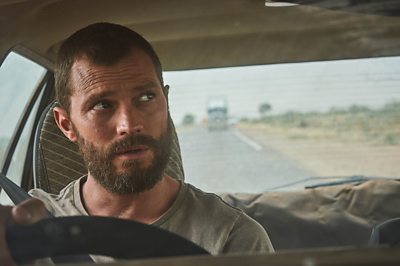
How did the project develop from early discussion? What were the ambitions?
Jack: Our goal was to try and do something different. We’ve written a lot of thrillers, but we felt that in writing this, we wanted to challenge ourselves and do something tonal, structural, and cinematic. Everything grew from that. We tackled big themes, to do with identity and working out who you are, which is very resonant on a lot of levels with a lot of people. I don’t think many people have woken up and had no recollection of who they were. But I think a lot of people struggle trying to work out, ‘What kind of person am I?’.
Harry: Finding that tonal peculiarity was something that really interested us. Going from one moment that’s thrilling and dark, to another moment that’s comedic and strange and absurd was appealing; we’ve done dark and grim thrillers but writing wise we’ve produced a lot of comedies as well. Mixing those two worlds and finding a way for them to live in the same show was the challenge of it but was also exciting.
Tell us about The Man? What does Jamie Dornan bring to that character?
Harry: Jamie’s a fantastic actor. I’ve never seen him be this kind of character – in this he’s brilliant, he’s enigmatic. He’s on this journey of figuring out who he is and why these things are happening to him. But he’s also on a spiritual journey, finding out whether he’s a good person or a bad person. Effectively he’s a new-born in this strange world of the Outback. Jamie brings so much intrigue, he’s incredibly likeable but he can also flip that. When we first met him for this, we thought he was incredibly funny and charming, and he brings a load of that to the part as well.
Jack: It’s hard trying to describe what kind of character The Man is, because that’s something we discover as he does. That’s what appealed to us. It’s almost like a character in a western, the stranger in town. Sometimes we’re projecting what we think onto them and sometimes we’re trying to work out who they are. I think to portray all that on all those levels, while not knowing who you fundamentally are, is interesting and Jamie did that brilliantly.
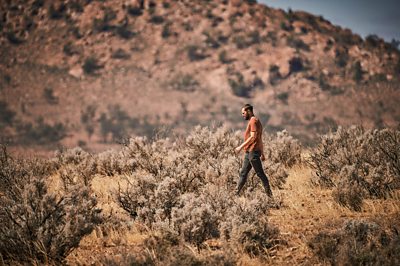
Tell us about working with directors Christopher Sweeney and Daniel Nettheim and their vision?
Harry: It was very collaborative. We went through the scripts page by page, with both in extreme amounts of detail. It was about the tone and striking the balance between comedy and drama, and how we level that tone and not push it too far into either territory. I’ve known Chris since I was 9 years old, so it’s a real shorthand kind of relationship, and Jack’s known him all our lives.
Jack: More than any other show we’ve done, we worked with our directors to watch a lot of tonal references and clips from movies, talking through scenes and looking at location pictures. There’s a lot going on in each scene, and it took a lot to try and get on the same page, particularly when we’re on two different continents, because we couldn’t be in Australia.
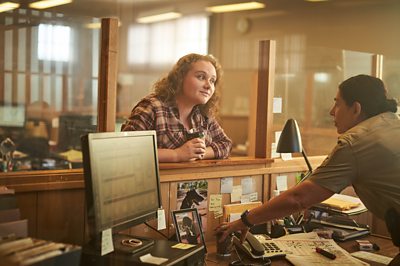
Can you tell us about the main themes of the series?
Harry: It’s an existential thriller. It’s about a guy trying to figure out who he is, which is a question that plenty of people who haven’t lost their memories still ask themselves.
Jack: The themes of this show are very universal. Who am I? Am I defined by the choices I have made or will make next? What kind of person do I want to be, can I escape that, or can I not? They’re fundamental things to every drama that anyone’s ever probably written. By foregrounding it in this way and making it about someone who doesn’t know who they are and following along with him, it’s very interesting. There’s the literal manifestation of it, which is ‘I’m going to find out how I ended up in the outback and how a truck ran me off the road and who wants me dead.’ But emotionally and metaphorically it’s far more interesting to say, ‘What does that mean? Why would someone want me dead? What have I done and am I still that person?’ Those themes are written not just for Jamie’s character but across all the other characters in the piece.
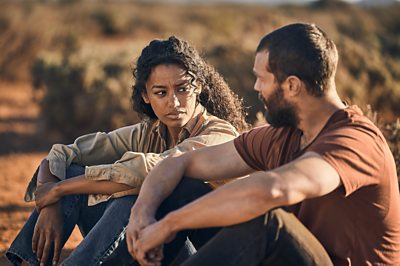
The dark humour is slight but so affecting – what was the intention behind this?
Jack: I don’t think when we first wrote episode one, we intended to do something that was quite as offbeat as it became. In writing it, we found a language emerging that felt to us sometimes quite funny, and that’s something we started to explore.
Harry: We’ve exclusively written very serious, very dark dramas and I think glimpses of humour started to make their way into the scripts. We felt that we shouldn’t stop ourselves from exploring that and really enjoyed doing it. It lived well within the show and added to it, rather than detracting from the drama in any way.
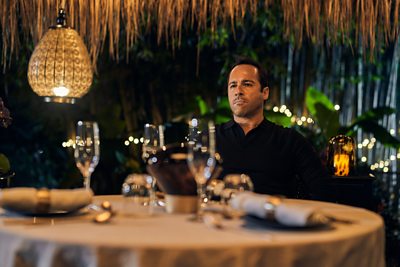
What sets this show apart from anything else you have written/created?
Jack: We’ve written about some very dark themes that often dictated how you have to write them. When you write a show like The Missing, about children going missing it’s not particularly appropriate to be funny, understandably.
Because of the setting and the premise, it felt like for the first time we could explore things that we haven’t in our dramas before because Jamie’s character finds himself in a world populated by strange people who just add to that unsettling feeling he has trying to figure out who he is and what kind of world he’s landed in. We gave ourselves licence to write what came into our heads for the first time and not censor ourselves.
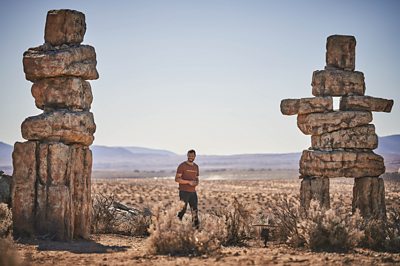
Did you have prior experience with the outback? Why was it important for the series to be set here?
Jack: I went to Australia a long time ago. When we were talking about where this show had to take place, we felt like it had to be somewhere remote. It had to be somewhere where, when you’re stranded, you’re really stranded, you’re in the middle of nowhere. I just remember driving through the outback and being on a road. Just looking down, the clouds of dust and that heat shimmer and thinking, ‘There is nothing and no one here and if you broke down there would be no one there to help you.’ It felt interesting to put a character like this in that situation. Once we found that, it worked out from there.
Harry: He’s this lost person – being lost in this vast expansive red earth felt like, dramatically, the right place for him to be.
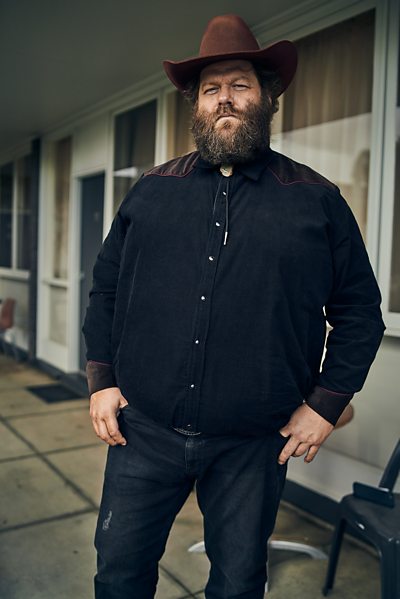
Do you have a favourite scene or scenes from the series that you could share with us?
Harry: There’s a scene in episode two where one of Billy’s employees comes to him in his garage and tries to squeeze him. That for me is a highlight, it hasn’t changed since the first cut. Benedict Hardie, who plays Justin, is amazing and Darri is incredible.
Jack: There’s also a scene in episode three where Billy goes to talk to Ethan and that’s pretty great. We can actually go on for quite a long time. The great thing about this show is that every time we’ve watched scenes while we’ve edited it, we go, ‘I love this scene’.
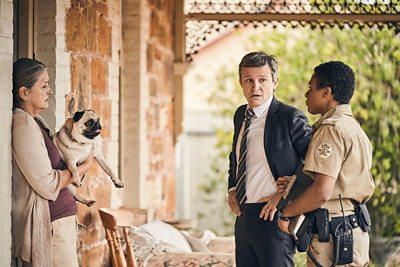
What will make this show compelling to audiences? What do you hope they will take away from the show?
Harry: I hope that its uniqueness and constant shifting in tone is of itself a constant surprise and will be the thing that intrigues audiences. As it’s a world where you don’t know what happens next and that’s the main reason to tune in. The best shows for me are the ones where you keep talking about it. I hope it stays alive in their minds and that people talk about it.
Jack: I think what’s interesting about this show is that there’s lots of twists and turns, it’s funny, it’s strange and surprising. The narrative is hopefully compelling! There’s a lot of really interesting questions that, as Harry says, hopefully people turn to each other on the sofa, or on Twitter, and disagree and have discussions. There are some interesting themes that we’re playing with, and I think that’s buried under the surface.
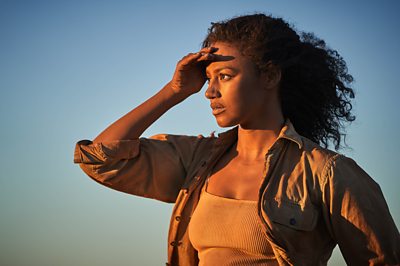
How will this show change the landscape of television drama?
Harry: In the UK I haven’t seen a show like this on air, certainly on ����ý One. It’s unusual and quirky and surprising. I hope that people just love it.
Jack: ����ý, HBO Max and Stan have been supportive of a show that is quite different to a lot of things we have seen, and I think what the directors have done is just so cinematic, unique and brilliant. We’re not intending to change anything but we’re happy as long as people enjoy it, because we think it’s really good!
Watch The Tourist on ����ý One and ����ý iPlayer from Saturday 1st January 2022 at 9pm
Listen to our podcast interview with Jack and Harry Williams

